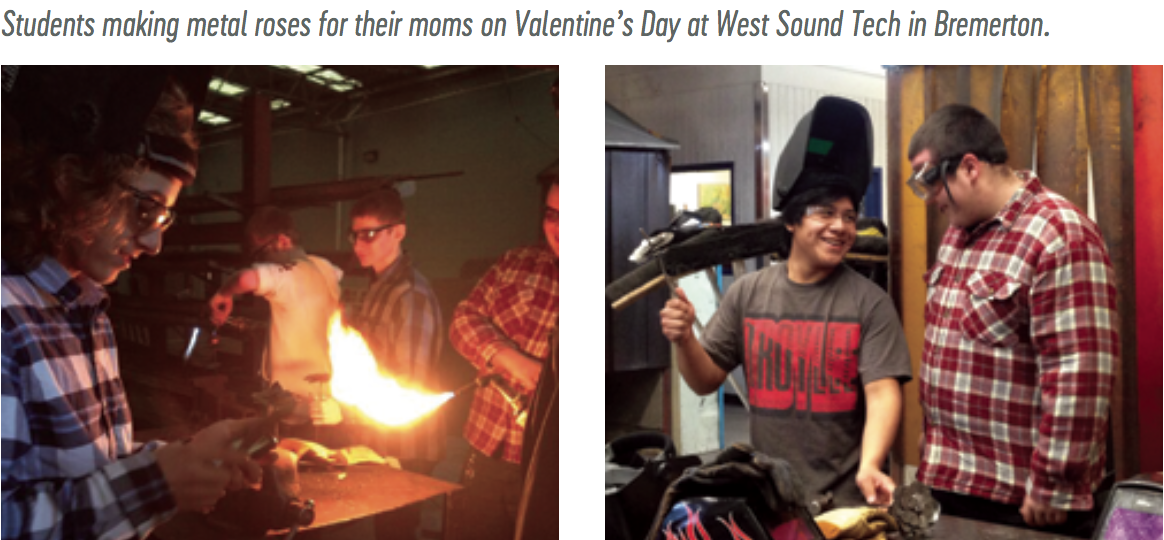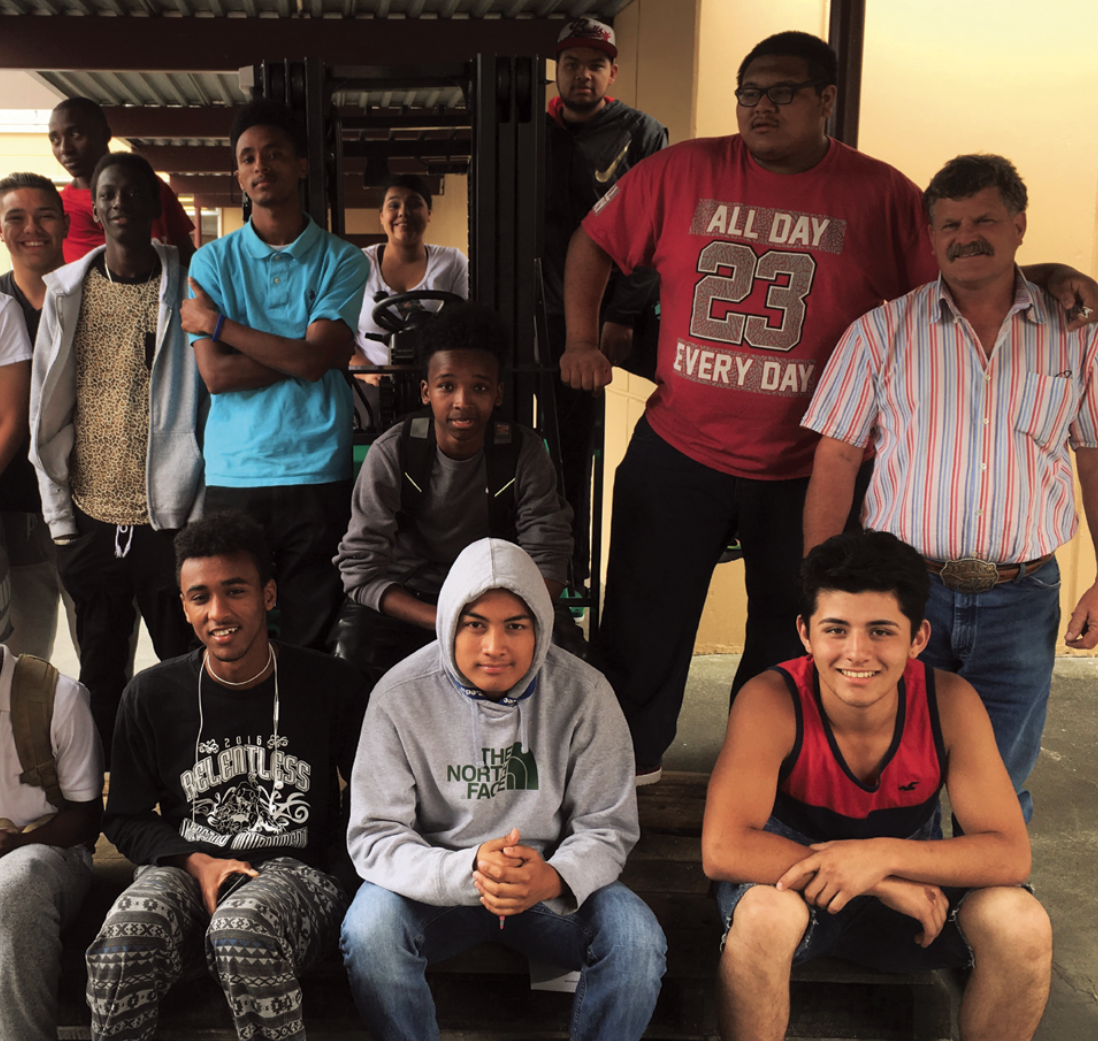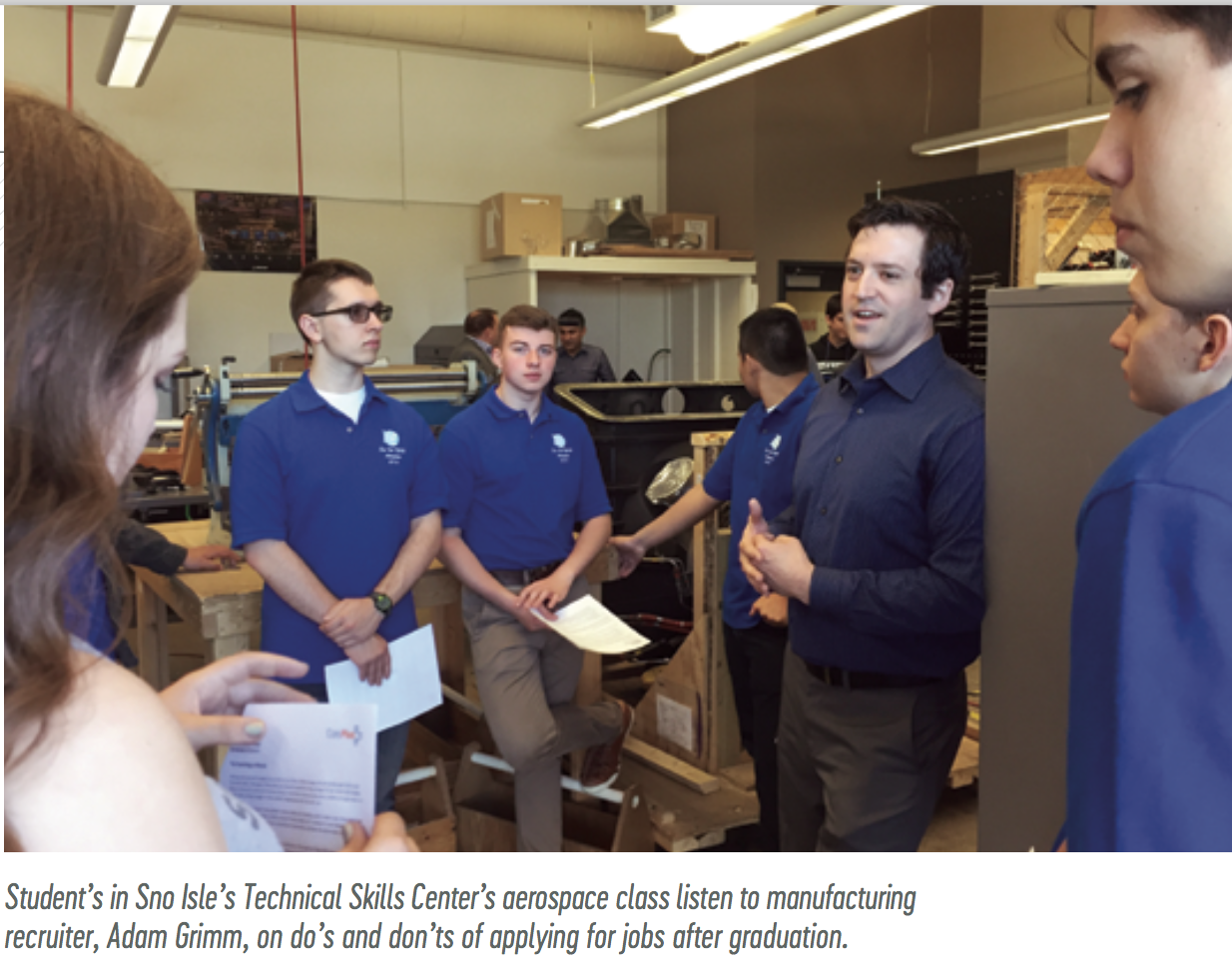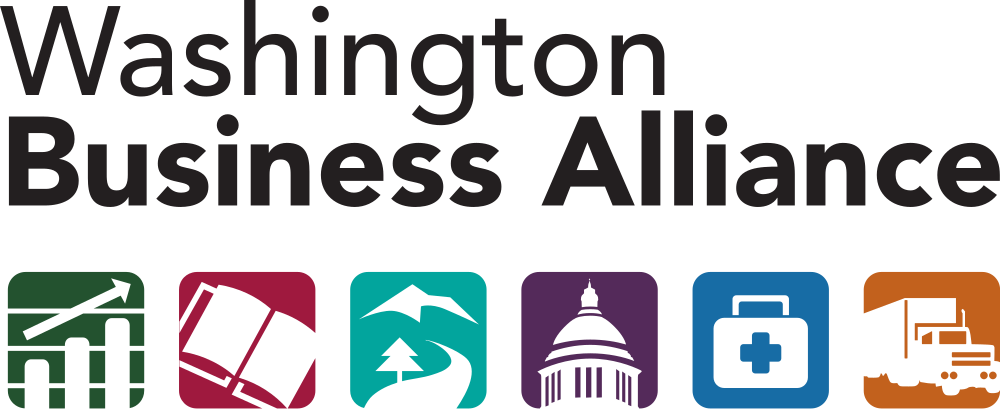$35,051.
THAT AMOUNT REFLECTS THE AVERAGE DEBT OWED BY STUDENTS GRADUATING FROM FOUR-YEAR COLLEGES IN 2015, BRINGING THE NATIONAL EDUCATION DEBT OF STUDENTS NATIONWIDE TO NEARLY $70 BILLION, REPORTS THE WALL STREET JOURNAL.
According to the Institute of College Access & Success (TICAS), Washingtonians on average fair a little better and owe $24,804 when they leave college. On the flip side, Washington is not faring well with the number of students who graduate from high school. The state ranks 38th in high school graduation rates according to TICAS. Washington’s marine industry is not immune to these national trends, and they directly affect the care your boat gets when it’s serviced at your favorite yard.
“In some ways, our education system is broken,” said Dave Gering, Executive Director of the Manufacturing Industrial Council (MIC), which is located in the SoDo area of Seattle. “We are doing our kids a disservice with the ‘college for all’ mantra of the past 20 years, and we need to build better pathways that help lead students to careers.”
Gering is the de facto leader of Core Plus, a Washington state-wide program focused on restoring high school shop programs. A coalition of nonprofits, trade associations, Boeing, JP Morgan Chase, and others have coalesced around a simple concept: Offer diverse learning opportunities to high school students and give them avenues right after graduation to high-quality jobs that address tremendous needs in boating and maritime as well as the aviation, construction, and agriculture sectors.
“What maritime is facing is exactly the same dilemma Boeing struggles with. How do we find high-quality workers over time to keep manufacturing world-class planes and boats in the Northwest?” said Gering. Some could argue that maritime, and recreational boating specifically, are facing more acute workforce shortages in Washington than their maritime colleagues across the country.
 “Washington state continues to lead the country in boat sales, and these boats need to be worked on somewhere with high-quality systems experts,” said George Harris of the Northwest Marine Trade Association (NMTA). “There are a couple of reasons that this area is so conducive to world-class boating. Looking outside, there’s the scenery, of course, but there’s also the 69 boatyards in our state and the 28,000 marine tradesmen and women working on everything from recreational boats to large cargo vessels,” he said.
“Washington state continues to lead the country in boat sales, and these boats need to be worked on somewhere with high-quality systems experts,” said George Harris of the Northwest Marine Trade Association (NMTA). “There are a couple of reasons that this area is so conducive to world-class boating. Looking outside, there’s the scenery, of course, but there’s also the 69 boatyards in our state and the 28,000 marine tradesmen and women working on everything from recreational boats to large cargo vessels,” he said.
While some readers may be surprised to see his reference to large cargo vessels and recreational boating in the same sentence, Harris has recently embraced the thinking that manufacturing and repair work across the sectors are fundamentally the same core competencies. “Due to our investment in Core Plus, I now see the close link between what Boeing’s workers do and how our boat builders go about building their latest project. It’s the same skill set, but applied and catered to differently, says Harris.
“All that said, our state and the entire marine industry is facing a continuing graying of the workforce,” he added. “We simply do not have the young people learning the skills in school that will ready them for employment in a marine trade. But that reality is changing and changing fast both in the state capitol and around the state.”
Career and technical education, and specifically Core Plus, have gained traction with NMTA members and lawmakers in a short amount of time. Scott Anderson of CSR Marine operates two boatyards in Ballard and Des Moines. He has reaped the benefits of such an education.
“It was love at first sight (when I first heard about Core Plus),” said Anderson. “I heard Dave Gering speak about offering shop classes to kids in school, and I said to myself and anyone who would listen, ‘That’s my story.’ Had I not had shop classes, I would be in prison or maybe even dead by this point,” he added.
“Supporting Core Plus has become my number one cause. I’m not getting any younger and to help establish a curriculum (under the guise of Core Plus) for the future employees of CSR and the other recreational boating businesses is where I’m investing my time and money,” he said. Some of the needs in the $4 billion recreational boating industry are greater than others.
 “We hear from employers all the time that they struggle to find talent,” said Harris of the NMTA, the nation’s oldest and largest marine trade association. “The problems are real, and they are two-pronged: How do we fill jobs today in the industry and how do we build a school system for the next generation of workers?”
“We hear from employers all the time that they struggle to find talent,” said Harris of the NMTA, the nation’s oldest and largest marine trade association. “The problems are real, and they are two-pronged: How do we fill jobs today in the industry and how do we build a school system for the next generation of workers?”
One way that NMTA, the owners of the Seattle Boat Show at the CenturyLink location, tackled this struggle was to create a job fair to coincide with the boat show. They gauged the interest of NMTA members and nonmembers.
“We were blown away by the level of interest, the amount of open positions, and the quality of the employment opportunities. On the other side of the equation, we couldn’t believe how hard it was to drive traffic to the job fair,” said Harris. At the first year’s job fair, there were 49 attendees. 150 people turned out for the 2015 job fair. “It’s hard to fill 250 openings when you only have 150 job-fair attendees.”
NMTA and other groups, such as the Washington Business Alliance and the Manufacturing Industrial Council, have laid out a multifaceted plan to direct young people toward marine trades. First, Anderson and other experts are developing a free curriculum that teachers can use on Day 1 of the school year.
Boeing and NMTA have been integral partners. “Boeing has invested over $750,000 in developing curriculum, and NMTA’s early arrival provided a key piece in a gigantic puzzle,” Gering said. Core Plus and career and technical education in general rely on relevant curriculum at their foundation, but success is also predicated on several other pieces. That’s where Colleen McAleer and the Washington Business Alliance come in. McAleer has assembled a coalition that will be ready when the Legislature convenes in January 2017.
“While the state legislature continues to grapple on general K-12 education funding issues over the past few years, funding for career and technical education has not kept pace. We’ve actually seen schools scale back these programs” said McAleer. “Fortunately, the dialogue is changing in Olympia and around the state that these careers are rock solid and needed to keep our state competitive with the rest of the world.”
“It’s so bad out there to find workers,” Anderson adds. “When I meet with prospective employees, my interview is pretty short. I hand them a mirror and if they can breathe into it, they are hired,” he said, laughing. He’s struck by how hard it is to find young people who show up on time, day in and day out, but he’s not giving up. “How can I? My story is the story of so many young people out there, but our education doesn’t meet the students where they are. I was struck by how teachers were the ones who enjoyed going to school every day. I was the opposite. I couldn’t wait to get out of school. But I now realize that the teachers weren’t teaching to me but to those like them that enjoyed Shakespeare and that other stuff.”
Gering has learned that getting Core Plus to stick will involve some missteps and starts and stops. Simply put, he’s tackling an important issue, testing what works and always adapting to the current reality.
“There’s no doubt that career counselors are part of the puzzle,” he said. “I wished we would have talked to them sooner. The simple fact is that they are overloaded by the number of students they try to serve. We need to get them much better information about industrial career opportunities.” Gering now sees counselors as a part of the coalition needed to turn the tide.
“At the end of the day, we’ve been fortunate. We have cultivated the relationships with the right people, like State Superintendent Randy Dorn, who already believed in these educational opportunities. Plus, we are way better at how we message our priority to lawmakers.”
Gering said lawmakers seem to have little interest in the term “workforce development” but, “once we started talking about (messaging around) educational opportunities and providing pathways for young people, we started making progress,” he added.
“The business community should approach this topic with a community priority to expand and enhance learning opportunities for kids and their families. That leads us to a broad expanse of common ground with educators and with parents. The greatest asset we have is our shared interest in helping kids. If we can maintain that community focus, the workforce issue will take care of itself.” Gering could be referring to 18-year-old Gene Ruff, who approaches every conversation with the thoughtfulness of a college professor. Plus, he has a handshake that will have you reaching for the ice pack.
“School wasn’t always my thing,” Ruff said. “I’ve been a gearhead since middle school and was always looking for the next chance to help my uncle work on cars.” He credits the hands-on experience of Core Plus for his recent employment at NMTA and now Boeing. “I can’t imagine life without Core Plus. Who knows what I’d be doing, maybe working at Old Navy right now.” Instead he’s climbing the ladder at Boeing and remains intrigued about working in the marine trades down the road. “The welding skills at Boeing are the same used in maritime. If and when the door knocks from an NMTA member, I’ll be there to open it,” said Ruff, who has finished his first month at Boeing.
 According to Gering, Ruff’s rise is typical and part of a larger conversation going on across the country. “You’ll hear debates at the federal level about ‘certificate-based learning.’ That’s what we are all about. I just got off the phone with education leaders in Ohio. The state of Ohio wants to implement Core Plus and we’re meeting next month with the education superintendent for Oregon,” Gering said. Gering does not pinpoint one specific reason for the spread of Core Plus, which has gone from two schools to more than 40 in five years around Washington. “We had a plan and stuck to it. I would speak once a quarter to a new audience, and we’ve built our campaign that way. You name the association of educators, and I’ve probably spoken to them about Core Plus.”
According to Gering, Ruff’s rise is typical and part of a larger conversation going on across the country. “You’ll hear debates at the federal level about ‘certificate-based learning.’ That’s what we are all about. I just got off the phone with education leaders in Ohio. The state of Ohio wants to implement Core Plus and we’re meeting next month with the education superintendent for Oregon,” Gering said. Gering does not pinpoint one specific reason for the spread of Core Plus, which has gone from two schools to more than 40 in five years around Washington. “We had a plan and stuck to it. I would speak once a quarter to a new audience, and we’ve built our campaign that way. You name the association of educators, and I’ve probably spoken to them about Core Plus.”
More success might be just around the corner with the new crop of legislators and statewide office holders in power. Specifically, there will be a new school superintendent and a new lay of the land in the Legislature after the November elections. Fortunately, Core Plus shows how much can be accomplished with relatively little money. With the state investment of just $450,000 per year, students across the state now have opportunities to learn industry-validated Core Plus “Knowledge, Skills and Abilities” from 40-plus teachers. These state start-up grants are the key. It shows what state government can do with relatively small amounts of money, according to Gering.
These grants supplement what private industry has already spent. This past year, there was over a million dollars in industry support. Boeing provided $750,000 for the written curriculum; other industry sponsors included the Manufacturing Industrial Council, Northwest Marine Trade Association, Port of Seattle, and Washington National Guard. Gering approaches the issue with a pragmatic optimism that has served him well as he works to protect and grow manufacturing in King County during his day job at the MIC.
 “Ten years ago, a bunch of us were sitting around the table saying, ‘Who’s going to work in industry once we retire?’” It was this conversation that set in motion 10 years of progress, but Gering realizes that their work in not done. “Now it’s time to turn to Olympia to bolster our success. We are prepared to make our case to the lawmakers that these educational opportunities are sorely needed for our young people. We can’t let them down.”
“Ten years ago, a bunch of us were sitting around the table saying, ‘Who’s going to work in industry once we retire?’” It was this conversation that set in motion 10 years of progress, but Gering realizes that their work in not done. “Now it’s time to turn to Olympia to bolster our success. We are prepared to make our case to the lawmakers that these educational opportunities are sorely needed for our young people. We can’t let them down.”
It won’t be an easy sell, however, given the budget crisis Washington finds itself in. The state Supreme Court is holding the Legislature in contempt of court for not fulfilling its paramount duty in the state constitution, which is to fund the state’s education system. But maritime is growing as an advocacy effort in Olympia. The Washington Maritime Federation and the Washington Business Alliance have both adopted “career and technical education” as core priorities for the 2017 legislative session, and lawmakers are paying closer attention than ever. Most recently, the bipartisan Maritime & Manufacturing Task Force for Economic Resiliency has listed these educational opportunities as tantamount to growing the sector. Rep. Gael Tarleton (D-Seattle) says the hard work is yet to be done.
“I grew up down the road from the Gloucester (Massachusetts) fishing fleet. I know first-hand what can happen to the maritime and fishing industry when not enough care and feeding are put into it,” Tarleton says. And this care and feeding surprises some. Anderson, for one, continues to struggle with the fact that the Legislature will not be doing everything it can to support career and technical education.
“I about fell out of my chair when I learned that I had to put my own money into Core Plus before the state would even consider supporting it,” he said. “Since then I’ve met with the governor and other lawmakers about this, but it’s still slow in the uptake on getting their budgets to reflect how important this issue is to simply keeping people out of jail. It makes no sense. What I have learned is that lawmakers may support us in principle but it’s their intensity that’s lacking.”
When it comes to lobbying efforts, Anderson and the rest of the coalition routinely cite the average salaries of maritime employees, which is $75,000, and the average pay of a Boeing machinist, which comes in at $60,000. Compared with the average pay of a Washingtonian ($55,000), it’s easy to see that these CorePlus-related careers are solid middle-class positions. Anderson, Tarleton, Gering, and the rest of the coalition are not anywhere near giving up selling this concept.
“When I’m done being a legislator, an important part of my legacy will be what I did to help young people find their way into maritime jobs,” Tarleton said. Tarleton’s task force of nine state senators and representatives from both sides of the aisle share a common bond: their communities border Puget Sound. “Unlike so many divisive issues we deal with, career and technical education for maritime and fishing jobs is a breath of fresh air. Legislators and staff need these shared interests to keep us all moving toward solutions for our communities. It’s not about what’s good for Republicans or Democrats but what works for all Washingtonians,” she said.
 As Gering brings up during his presentations, there is a national dimension to the topic. “Our country needs these kids to maintain our industrial capacity. Switzerland is nice, but we’re not Switzerland. The kids with aptitude also need to find these opportunities early – the sooner, the better. They give up significant earning potential if they wait until their 30s or 40s to get started. We can’t just give up that kind of national or personal productivity.”
As Gering brings up during his presentations, there is a national dimension to the topic. “Our country needs these kids to maintain our industrial capacity. Switzerland is nice, but we’re not Switzerland. The kids with aptitude also need to find these opportunities early – the sooner, the better. They give up significant earning potential if they wait until their 30s or 40s to get started. We can’t just give up that kind of national or personal productivity.”
Ruff isn’t giving up on maritime. He is weeks into his Boeing career, but remains optimistic that down the road he will find himself back in the recreational boating field. “I will never close that door,” Ruff said. “Welding is welding, and I’m going to answer the door if and when opportunity knocks (from a maritime employer). Plus, it’s smart that so many people are united on a common theme. I can tell you that my classmates seem to struggle with the ‘what are you going to do after high school’ question. College isn’t for everyone, and for those who think college is for them probably end up after graduation asking themselves, ‘Now what?’ As for me, I know what I want to do and it looks like I’ve found something that will create a nice living for myself. Plus, I don’t have any loans to worry about.”
The coalition supporting Core Plus is busy preparing for the 2017 legislative session as this story goes to print. Given how poorly Washington has funded education in the past, best exemplified by the McCleary decision that found the Legislature to be in contempt of court for not adequately funding basic education, Core Plus and related programs will remain in the news for years to come.
